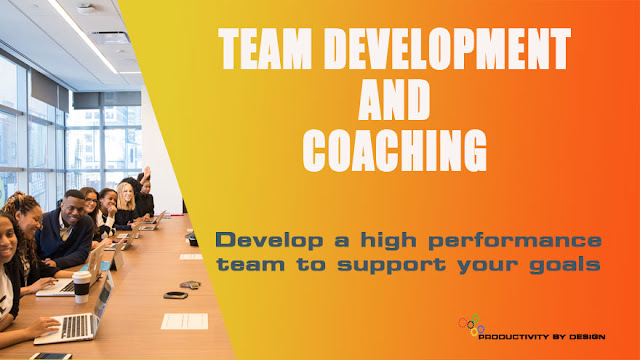Team development and coaching are essential for fostering high-performing teams and driving organizational success.
By investing in these areas, leaders can cultivate a positive work environment, boost employee morale, and achieve sustainable growth.
- What is Team Development?
- The Role of Coaching in Team Development
- Key Strategies for Effective Team Development and Coaching
- Overcoming Challenges in Team Development and Coaching
- The Benefits of Team Development and Coaching
- Additional Tips for Effective Team Development and Coaching
What is Team Development?
Team development is a continuous process that enhances a team's performance and effectiveness.
It involves a series of steps to improve collaboration, communication, and overall productivity:
- Identifying Team Goals: Clearly defining the team's objectives and aligning them with broader organizational goals.
- Assessing Team Strengths and Weaknesses: Conduct a thorough analysis of the team's capabilities and limitations to identify areas for improvement.
- Developing Team Members: Providing opportunities for growth and development through training, mentoring, and coaching.
- Building Team Relationships: Fostering a positive and collaborative team culture where members feel valued and supported.
- Enhancing Team Communication: Improving communication channels to facilitate information sharing, problem-solving, and decision-making.
The Role of Coaching in Team Development
Coaching plays a pivotal role in team development by providing guidance, support, and accountability.
A skilled coach can help team members:
- Identify and Overcome Obstacles: Provide strategies and techniques to navigate challenges and find solutions.
- Set and Achieve Goals: Establish clear, achievable goals and track progress to ensure accountability.
- Improve Performance: Offer constructive feedback and guidance to enhance skills and performance.
- Build Confidence: Encourage self-belief and empower team members to take on new challenges.
- Enhance Leadership Skills: Develop leadership abilities to empower team members and foster a positive team culture.
Key Strategies for Effective Team Development and Coaching
Set Clear Expectations:
- Clearly communicate team goals, individual responsibilities, and performance standards.
- Provide regular feedback and recognition to motivate and inspire team members.
Foster a Positive Team Culture:
- Build trust and respect among team members through open and honest communication.
- Encourage collaboration, creativity, and innovation.
- Celebrate successes and learn from failures to create a positive and supportive environment.
Invest in Training and Development:
- Provide opportunities for team members to acquire new skills and knowledge.
- Offer tailored training programs to address specific needs and development goals.
- Encourage continuous learning and professional growth.
Practice Active Listening:
- Pay attention to what team members are saying and feeling.
- Ask open-ended questions to encourage dialogue and deeper understanding.
- Provide empathetic responses and show genuine concern.
Provide Constructive Feedback:
- Deliver feedback in a timely, specific, and constructive manner.
- Focus on behaviours and outcomes, not personalities.
- Offer actionable advice for improvement.
Empower Team Members:
- Delegate authority and responsibility to foster ownership and accountability.
- Encourage decision-making and problem-solving skills.
- Provide the necessary resources and support to succeed.
Celebrate Successes:
- Recognize and reward individual and team achievements.
- Create a positive and motivating work environment.
Overcoming Challenges in Team Development and Coaching
- Resistance to Change: Address resistance by involving team members in the change process and communicating the benefits of the changes.
- Time Constraints: Prioritize team development activities and allocate dedicated time for coaching and mentoring.
- Lack of Resources: Seek creative solutions to overcome resource constraints, such as leveraging technology or partnering with external organizations.
- Managerial Ineffectiveness: Provide training and support to managers to improve their coaching and leadership skills.
The Benefits of Effective Team Development and Coaching
- Increased Productivity: A well-developed and motivated team can achieve higher levels of productivity and efficiency.
- Improved Employee Morale: Investing in team development and coaching can boost employee morale and job satisfaction.
- Enhanced Innovation: A collaborative and creative team can generate innovative ideas and solutions.
- Stronger Organizational Culture: A strong team culture can contribute to a positive and productive work environment.
- Reduced Turnover: A well-supported and engaged workforce is less likely to leave the organization.
Additional Tips for Effective Team Development and Coaching
- Set SMART Goals: Ensure that goals are Specific, Measurable, Achievable, Relevant, and Time-bound.
- Use a Variety of Coaching Techniques: Tailor your coaching approach to the individual needs of each team member.
- Build Trust and Rapport: Establish a strong relationship with your team members based on trust, respect, and empathy.
- Practice Self-Awareness: Understand your own strengths and weaknesses as a leader and coach.
- Continuously Evaluate and Improve: Regularly assess the effectiveness of your team development and coaching efforts and make adjustments as needed.
Organizations can cultivate high-performing teams that drive business success by prioritising team development and coaching.
Organizations can unlock their full potential and achieve sustainable growth by investing in their people.



1 Comments